Viewing search results for "https://www.digitalnc.org/newspapers/q-notes/"
View All Posts
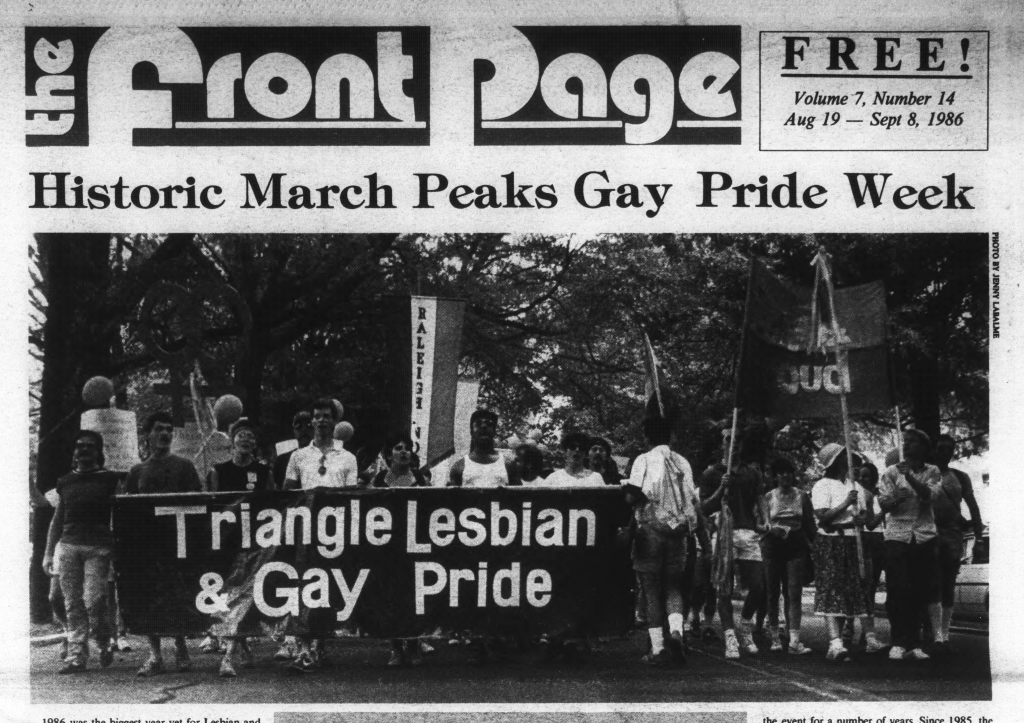 The first 8 years of The Front Page newspaper, from 1979-1986, are now on DigitalNC. The Front Page was published in Raleigh for twenty-six years covering “news and happenings of interest to gay people.” The paper covered national and local news impacting and of interest to the LGBTQ+ community. There are ads for local businesses that were safe spaces for LGBTQ+ individuals, and a community calendar listed events. There’s also a Q&A column where letters from readers all over the state wrote in with problems or questions to recieve a broad spectrum of personal advice.
The first 8 years of The Front Page newspaper, from 1979-1986, are now on DigitalNC. The Front Page was published in Raleigh for twenty-six years covering “news and happenings of interest to gay people.” The paper covered national and local news impacting and of interest to the LGBTQ+ community. There are ads for local businesses that were safe spaces for LGBTQ+ individuals, and a community calendar listed events. There’s also a Q&A column where letters from readers all over the state wrote in with problems or questions to recieve a broad spectrum of personal advice.
Q-Notes, a prominent Charlotte area LGBTQ+ newspaper and the one Front Page merged with in 2006, published a retrospective of The Front Page and an interview with the Page‘s publisher Jim Baxter in the July 29, 2006 issue. Baxter penned an article in IndyWeek shortly after the paper’s final issue, and it describes parts of his career and the history of Front Page.
The paper has been added with kind permission from the publishers and thanks to efforts by staff at the libraries at the University of North Carolina at Charlotte and Duke University. Digitization of this paper was funded by an IDEA Action Grant from UNC-Chapel Hill Libraries. Archived issues of Q-notes are available from our site, and you can view more current content at their site.

Dawn Schmitz, Associate Dean for Special Collections & University Archives at Atkins Library, UNC Charlotte
This year marks the North Carolina Digital Heritage Center’s 10th anniversary, and to celebrate we’ll be posting 10 stories from 10 stakeholders about how NCDHC has impacted their organizations.
Today’s 10 for 10 Q&A is from Dawn Schmitz, Associate Dean for Special Collections & University Archives at Atkins Library, UNC Charlotte. Since 2010, we’ve partnered with UNC-Charlotte’s Atkins Library (Library home page | NCDHC contributor page) digitizing yearbooks and catalogs, maps, photographs, and newspapers. You should also head over to Goldmine, their digital collections website, where you’ll find oral histories, maps, photographs, and other items documenting the history of the Charlotte area and UNC-Charlotte. Read below for more about our partnership with UNC-C.
What impact has NCDHC had on your institution and/or on a particular audience that means a lot to you?
In 2017, you put out a call for nominations for digitization projects that would help document the history of underrepresented groups in our state. You immediately responded to my nomination of QNotes, a Charlotte LGBTQ newspaper that has been published since the 1980s. As a result, this publication is now online, freely available to the community (rather than behind a paywall), and used regularly by QNotes staff, queer studies scholars and students, and the general public. To top it all off, your bloggers did an incredible job of promoting the resource, highlighting its significance for LGBTQ history. Jim Yarbrough, publisher of QNotes, wrote in the newspaper, “To see our staff’s work made available to a larger audience and future generations — it’s indescribable.”
Do you have a specific user story (maybe your own!) about how DigitalNC has boosted research or improved access to important information?
There are so many examples of reference questions we have answered with a link to DigitalNC. One question I received from our University Communications office was particularly fun and satisfying to answer: When was our sports team first referred to as the forty-niners? Our Athletics department believed it was 1963. But using DigitalNC, I found a mention in the student newspaper two years earlier. (Charlotte collegian., November 01, 1961, page 4 )
What item or group of items on DigitalNC.org do you think everyone should know about?
It’s so hard to choose! For our alumni and the entire NinerNation, the student newspapers, yearbooks, and course catalogs are so important. I personally love the city directories for the wealth of information they contain about Charlotte in the late nineteenth and early twentieth centuries.
If you were asked to “describe what makes NCDHC great” in a few words, what would they be?
NCDHC a first-rate operation: responsive, professional, innovative, inclusive, community-engaged, and indispensable!
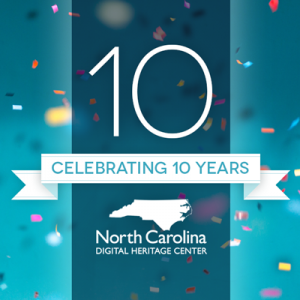
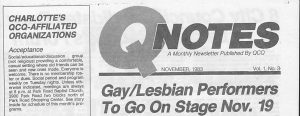
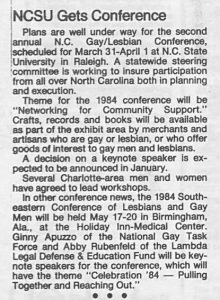 The newest batch of Q-notes, Charlotte’s LGBT newspaper, adds very early issues of Q-notes to DigitalNC. These issues from 1983 and 1984 were published as a monthly newsletter by Queen City Quordinators (QCQ), a non-profit group established in 1981 by gay activist Don King and lesbian activist Billie Stickell. According the the Q-Notes website,
The newest batch of Q-notes, Charlotte’s LGBT newspaper, adds very early issues of Q-notes to DigitalNC. These issues from 1983 and 1984 were published as a monthly newsletter by Queen City Quordinators (QCQ), a non-profit group established in 1981 by gay activist Don King and lesbian activist Billie Stickell. According the the Q-Notes website,
“The newsletter ended its run in 1984, with the close of the non-profit. In 1986, the newsletter was revived, and the publication was reborn as a monthly, print newspaper. The first issue of the revived community news source was published in June 1986, to coincide with National LGBT Pride Month.”
The early Q-Notes QCQ newsletters shed light on issues facing the LGBT community in Charlotte in the early 1980s and show the some of the grassroots resources and organizations pushing for information, safety, and acceptance. Conferences, meetings, and support groups were highlighted as ways of finding and building communities. Another important resource was the Gay/Lesbian Switchboard, a volunteer-run hotline providing information to Charlotte’s LGBT community.
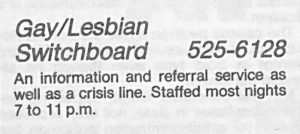
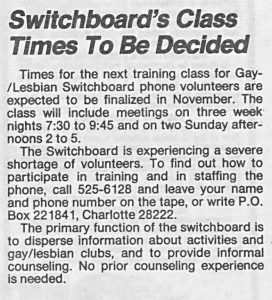 This batch also includes newer issues of Q-notes from the 2000s, completing our run of Q-notes provided by our partner, University of North Carolina at Charlotte. To see more materials from University of North Carolina at Charlotte visit their DigitalNC partner page or take a look at their website.
This batch also includes newer issues of Q-notes from the 2000s, completing our run of Q-notes provided by our partner, University of North Carolina at Charlotte. To see more materials from University of North Carolina at Charlotte visit their DigitalNC partner page or take a look at their website.
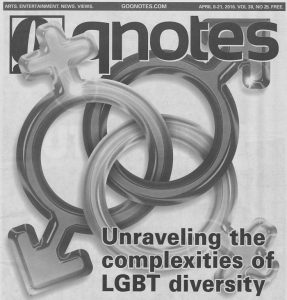
The cover of the April 8-21 issue of Q-notes
The last batch of Q-notes, a newspaper provided by our partner, the University of North Carolina at Charlotte, covers the years 2005-2010 and 2015-2016. These issues join previously digitized issues from 1986-2004 on DigitalNC, and digitized issues on the Q-notes website from 2008-2013.
Q-notes is newspaper that serves the LGBT community in North Carolina with a focus on Charlotte and the surrounding areas. The currently digitized span shows the evolution of relevant LGBT issues in the American South from the late 1980’s through the late 2010’s, which mirrors the evolution of the look and feel of Q-notes as a publication.
In the last two decades, incremental strides have been taken in terms of legal equality and acceptance of the LGBT community, much of which has been documented in the pages of Q-notes. Q-notes has captured issues such as the struggle for the legal status of same-sex marriage to the Don’t Ask Don’t Tell Repeal Act to an increase in representation of LGBT individuals in the media culture. More current issues of Q-notes remind us that we have a ways to go, for example providing legal protection for and cultural inclusion of trans and non-binary individuals.
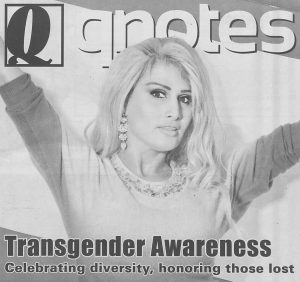
The cover of the November 4-17 issue of Q-notes
During the past 20 years, Q-notes has also evolved from an 8 page monthly paper with an underground aesthetic to a much longer bi-weekly publication with a more polished appearance that is matched by a constantly updated website.
To learn more about Q-Notes, visit their website. To learn more about our partner, University of North Carolina at Charlotte, visit their partner page or take a look at their website.

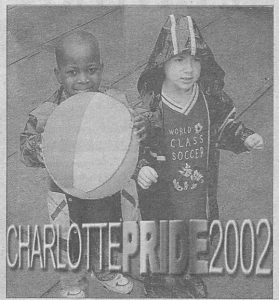
Youngsters at Charlotte Pride 2002 as seen in the May 25, 2002 issue of Q-notes
More issues of the newspaper Q-notes, provided by our partner the University of North Carolina at Charlotte, are now up on DigitalNC. These new issues cover the years 1997-2004 and join previously digitized issues from 1986-1996.
Q-notes is a newspaper that serves the LGBT community of Charlotte as well as the greater LGBT community in the state of North Carolina. Over the years that have been digitized, Q-notes grew as a publication from an 8 page newspaper published once a month to a 40 page paper published every two weeks. Currently Q-notes is published both online and in print form.
With the expansion of the publication, Q-notes was able to tackle more content ranging from coverage of local events, news stories, and advertisements to national and international news stories and features. The late ’90s and early ’00s was a time of many changes for the United Sates LGBT community, and Q-notes articles reported on the changing attitudes and experiences surrounding LGBT culture.
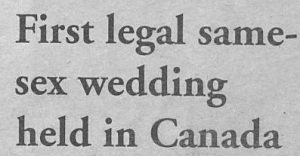
Headline from the January 20, 2001 issue of Q-notes
Q-notes was able to report many firsts. The first legal same-sex wedding in Canada was held in 2001, followed by the first legal same-sex wedding in the United states in 2004. In 2001, the first openly gay soldier completed his term of service in the United States Army Reserves despite facing potential discharge. LGBT centers opened up throughout the state of North Carolina and there were many pride festivals, marches, and demonstrations on both local and national levels.

Headline from the January 22, 2000 issue of Q-notes.
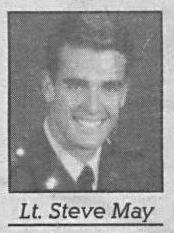
Lt. Steve May, the first openly gay soldier to complete his army term of service as seen in the April 28, 2001 issue of Q-notes
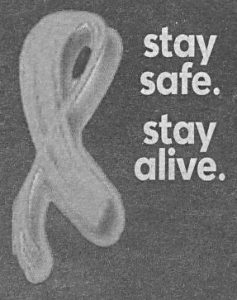
From an article on Wold AIDS Day in the November 23, 2002 Q-notes
In addition to these achievements, articles from this batch of Q-notes also reported on discrimination and violence that LGBT community members continued and still continue to face. These issues often played out in the arena of politics. Q-notes kept a close eye on the 2000 US presidential election and reported on both overtures and discouraging comments made to and about the LGBT community by candidates. Local politics were also covered, with Q-notes reporting on local elections, giving endorsements to candidates, and identifying local issues that would be of interest to Q-notes readers.
During this time Q-notes also continued to report on the AIDS crisis. Although by the end of the ’90s new AIDS diagnoses were decreasing, many LGBT individuals and the LGBT community continued to be affected. Awareness campaigns were championed by Q-notes, and articles intended to reduce stigma surrounding both the disease and ideas of safe sex were published.
Though turbulent times for the LGBT community, Q-notes continued to promote spaces where LGBT individuals could feel safe, comfortable, and have fun. Monthly event calendars and coverage of community activities remained strong throughout the years. With more pages in Q-notes, a regular culture section was established. Fun advertisements continued to permeate the pages, both from business specifically catering to the LGBT community, and increasingly from larger national companies.
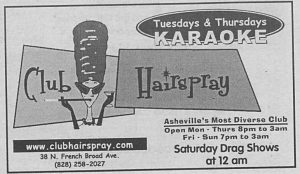
An advertisement from the December 7, 2002 Q-notes
To browse all of the digitized issues of Q-notes click here. To learn more about the University of North Carolina at Charlotte visit their website, or check out their partner page to see previously digitized materials. To see more recent issues of Q-notes, visit the Q-notes website.
About six months ago we asked our partners to help us increase the diversity of voices shared on DigitalNC. We had an outpouring of interest, and partners have shared a number of rich collections from the African American and LGBTQ communities. Here’s an update of what has been added to DigitalNC as a result of this call.
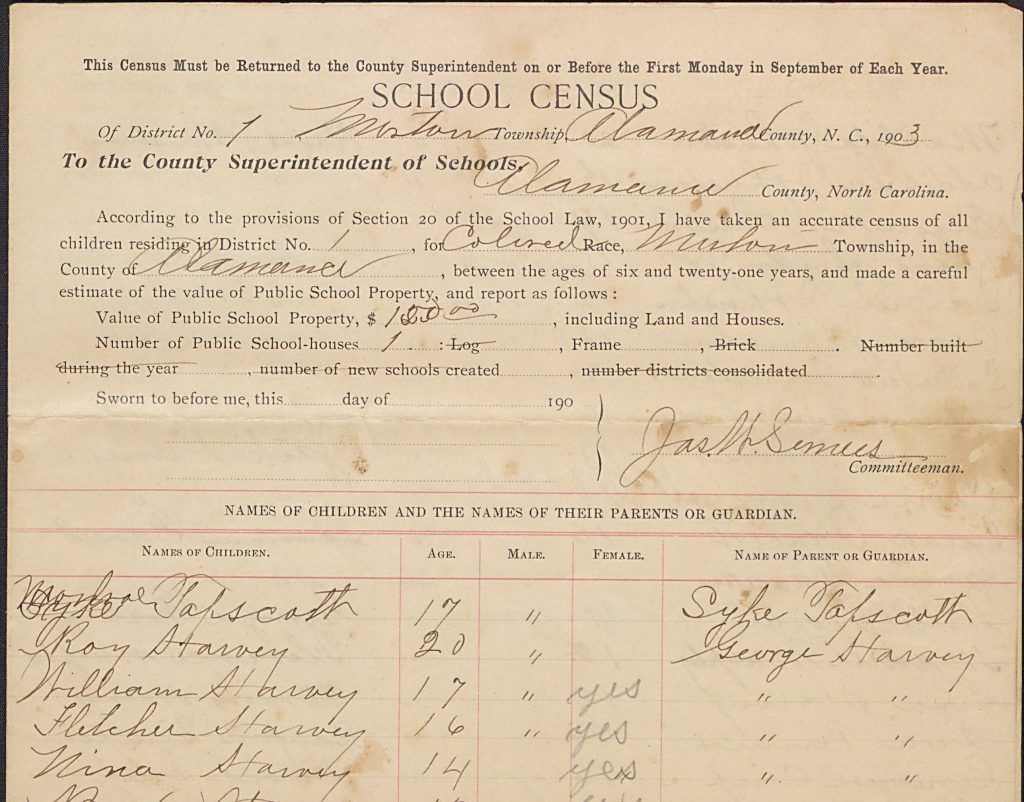
This 1903 Census Report for Morton Township, Alamance County, lists names, ages, and the names of parents of African American students.
Alamance County Public Libraries shared a wide variety of materials documenting African American communities in that county. Two groups of photographs, the Heritage of Black Highlanders and Asheville YWCA Photograph Collection, are parts of larger collections held by University of North Carolina at Asheville.
Several partners added African-American newspapers to those already shared online at DigitalNC.
We’ve also been working with University of North Carolina at Charlotte to share issues of Q-Notes, which covers updates, events, and issues of the LGBTQ community.
Diversifying DigitalNC isn’t a one-time event – it’s ongoing every day. If your institution has or will be targeting collections that document racial, ethnic, or geographic communities who are underrepresented on DigitalNC, and you’re interested in sharing these materials online, get in touch.
 Issues of Q-Notes from 1986-1996 are now available on DigitalNC. These newspapers were shared by our partner, University of North Carolina at Charlotte, in response to our call for materials documenting voices underrepresented on DigitalNC.org. Q-notes focuses primarily on Gay and Lesbian issues both in Charlotte and nationally. At a time when LGBT communities were facing persecution and backlash against increased visibility and demands for rights, Q-Notes provided a venue for individuals to affirm their identities.
Issues of Q-Notes from 1986-1996 are now available on DigitalNC. These newspapers were shared by our partner, University of North Carolina at Charlotte, in response to our call for materials documenting voices underrepresented on DigitalNC.org. Q-notes focuses primarily on Gay and Lesbian issues both in Charlotte and nationally. At a time when LGBT communities were facing persecution and backlash against increased visibility and demands for rights, Q-Notes provided a venue for individuals to affirm their identities.

A headline from a July 1987 article.
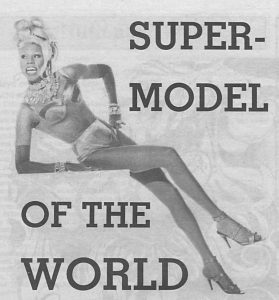
An interview with RuPaul was featured in the December 1st 1992 issue of Q-Notes.
A Q-notes interview with drag queen and musician RuPaul, who hails from Georgia and often performed in Charlotte during the 1990’s, embodies a tone taken in many Q-Notes articles. In a 1992 interview, when asked to explain her drag persona, she says “RuPaul is a universal concept. She’s about self-love and self-acceptance, being who you are and being proud of who you are.” This interview occurred right before RuPaul’s music and modeling career took off nationally, and her current success as a pop-culture star in many ways mirrors the increasing acceptance of LGBT culture within the US. Other articles in Q-Notes provided explanations for why pride festivals matter, and offered personal stories of individuals dealing with issues of self-acceptance. This decade of Q-Notes sought to connect LGBT readers to a greater community that shared their struggles and supported their identity.
In addition to interviews and articles, Q-Notes included event calendars, flyers, and ads that often use subversive imagery. These features mark Q-Notes as a proudly “underground” publication that gave voice to different subcultures. Ads especially explored many aesthetics from punk to glam, and were not afraid of irreverence.

An ad for Repo Records with a punk aesthetic in the January 1996 issue of Q-Notes.
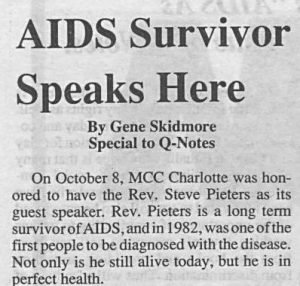
An article in the November 1989 issue of Q-Notes features Reverend Steve Pieters speaking about his experience living with AIDS.
Q-Notes also tackled serious issues. During the 1980’s and 1990’s, the AIDS epidemic was devastating LGBT communities. Stigma, misinformation, and fear surrounding AIDS was rampant, and Q-Notes published articles spreading awareness and calling on readers to advocate for organizations and federal programs fighting the epidemic. Personal stories of those living with AIDS and caring for friends and family members with AIDS joined articles analyzing different policies and treatments that could possibly curb the epidemic.
The fight for equal rights and protections is also documented in Q-Notes. Q-Notes covered large national events, such as the Second National March on Washington in 1987, which pushed for legal recognition of lesbian and gay relationships, and a presidential order banning discrimination based on sexual orientation. Articles also focused on local issues of assault and harassment. One issue included a feature by the North Carolina Coalition for Gay and Lesbian Equality that urges readers to report instances of harassment based on sexual orientation.
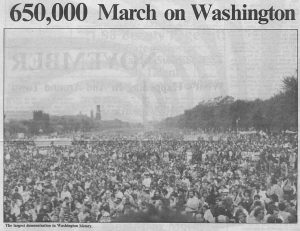
The Second March on Washington was covered in the November 1987 issue of Q-Notes. The caption declares it “the largest demonstration in Washington history.”

Part of a feature decrying harassment in the April 1st issue of Q-Notes.
Q-Notes has undergone many changes throughout the years, as have issues concerning LGBT communities. Q-Notes exists currently as qnotes and has a print and online version that continues to focus on LGBT issues in North Carolina.
To view issues of Q-Notes click here. To see more materials from University of North Carolina at Charlotte, take a look at their partner page, or learn more about them by visiting their website.
 The first 8 years of The Front Page newspaper, from 1979-1986, are now on DigitalNC. The Front Page was published in Raleigh for twenty-six years covering “news and happenings of interest to gay people.” The paper covered national and local news impacting and of interest to the LGBTQ+ community. There are ads for local businesses that were safe spaces for LGBTQ+ individuals, and a community calendar listed events. There’s also a Q&A column where letters from readers all over the state wrote in with problems or questions to recieve a broad spectrum of personal advice.
The first 8 years of The Front Page newspaper, from 1979-1986, are now on DigitalNC. The Front Page was published in Raleigh for twenty-six years covering “news and happenings of interest to gay people.” The paper covered national and local news impacting and of interest to the LGBTQ+ community. There are ads for local businesses that were safe spaces for LGBTQ+ individuals, and a community calendar listed events. There’s also a Q&A column where letters from readers all over the state wrote in with problems or questions to recieve a broad spectrum of personal advice. 


 The newest batch of
The newest batch of 

















